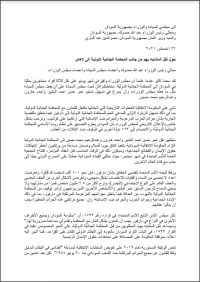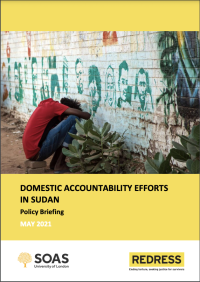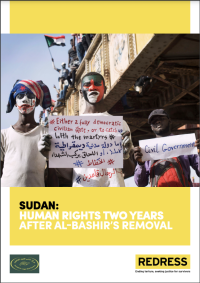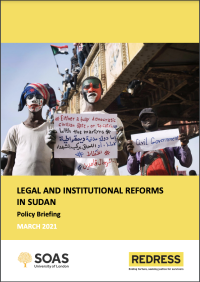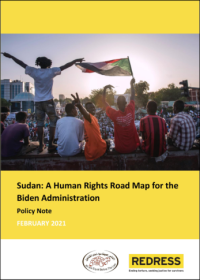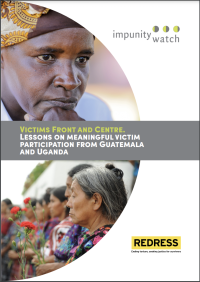Publications
REDRESS’ publications are also available in hard copy format. Please contact us for further information on [email protected].
REDRESS and 66 other civil society organisations wrote to Sudan's transitional government, urging it to urge the government to follow through on recent commitments to deepen its cooperation with the ICC by transferring former president Omar al-Bashir, Ahmed Haroun, and Abdel Raheem Muhammed Hussein to The Hague.
Sudan’s transitional government has taken some important steps towards securing justice for past human rights violations and international crimes in Sudan, but more is needed. As this policy briefing discusses, this includes additional progress on the planned justice institutions under the Juba Peace Agreement and Constitutional Charter 2019, and the elimination of remaining legal and institutional obstacles to accountability. To date, the perpetrators of serious human rights violations and international crimes in Sudan have, by and large, not been held accountable, even as human rights violations continue throughout Sudan.
REDRESS and the People's Legal Aid Centre (PLACE) made this submission as part of the Universal Periodic Review (UPR) of Sudan. The submission focuses on progress made by Sudan's transitional government towards the effective prohibition of torture and other human rights abuses, as well as the additional steps needed to ensure their non-repetition and accountability for past violations,
The Juba Peace Agreement and the 2019 Constitutional Document commit Sudan’s transitional government to making a series of critical human rights reforms. A set of legislative amendments in November 2019 and July 2020 addressed key issues in Sudan, including female genital mutilation, cooperation with the International Criminal Court, and torture. While these reforms were widely welcomed outside of Sudan as a sign of the government’s commitment to addressing legislative shortcomings as part of Sudan’s political transition, more is needed.
This policy briefing suggests several priority areas for reform, including the review of security and judicial sector policies and practices, the criminalisation of torture and enforced disappearances in Sudan’s criminal code in conformity with UNCAT, and human rights training for government actors in key sectors, among others. These steps should be taken in collaboration with the whole spectrum of stakeholders including civil society, victims, communities, and marginalised groups in Sudan.
The new US president, Joe Biden, has signaled his commitment to resetting the US relationship with countries in Africa, including through a focus on fighting corruption and advancing human rights on the national and regional level. As part of this commitment to promoting democracy and enhancing protections for historically marginalised groups, the Biden administration should double down on a human rights-centred policy in Sudan. There is real momentum in Sudan for important reforms, but strong voices for change must contend with a deepening economic crisis and political headwinds. Recognising these challenges, the US should take concrete action to reinforce recent steps towards democratization and human rights reforms. This Briefing Note by REDRESS and PLACE lays out several human rights priorities for the United States in Sudan under the new administration.
This briefing note analyses the key elements of Sudan’s general amnesty, which was announced on 12 November 2020, and provides several points of clarification for the transitional government on the resolution’s scope of application.
The report stems from extensive research and consultations that were carried out with victims of armed conflict in Guatemala and Uganda. Both countries have been the focus of international assistance for transitional justice for many years and, as such, they provide a long-term perspective on what has worked and what has not in terms of victim participation. This report is our attempt to recapitulate and explain what “victim-centred” should mean in the specific context of transitional justice. What is meaningful and can lead to change and what is merely ticking the box or promoting a mantra without providing the space for victims to shape their own future?
In a joint letter to the Sudanese transitional government, over 20 civil society organisations urged the government to promptly ratify the UN Convention against Torture and Other Cruel, Inhuman or Degrading Treatment or Punishment (UNCAT) and the International Convention for the Protection of All Persons from Enforced Disappearances (ICPPED).
